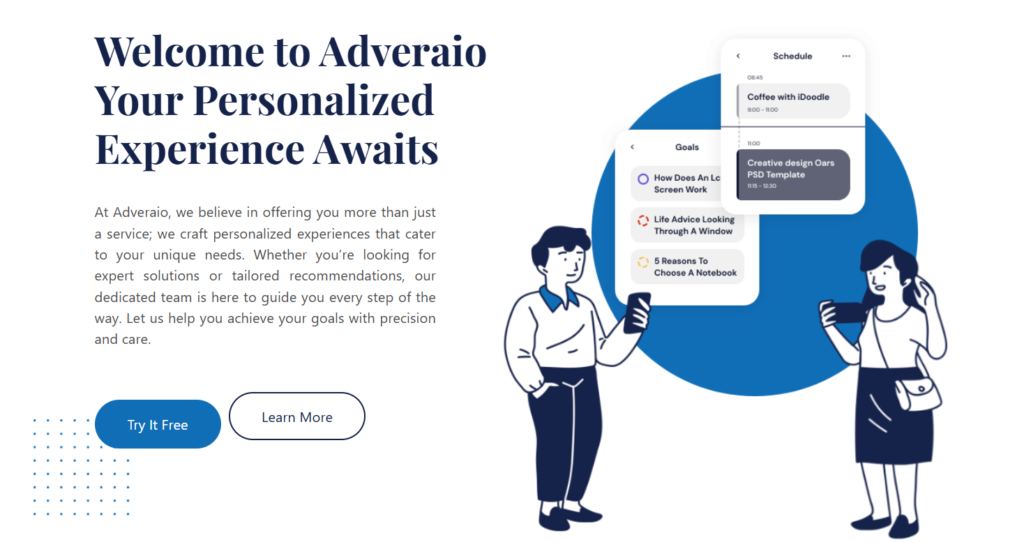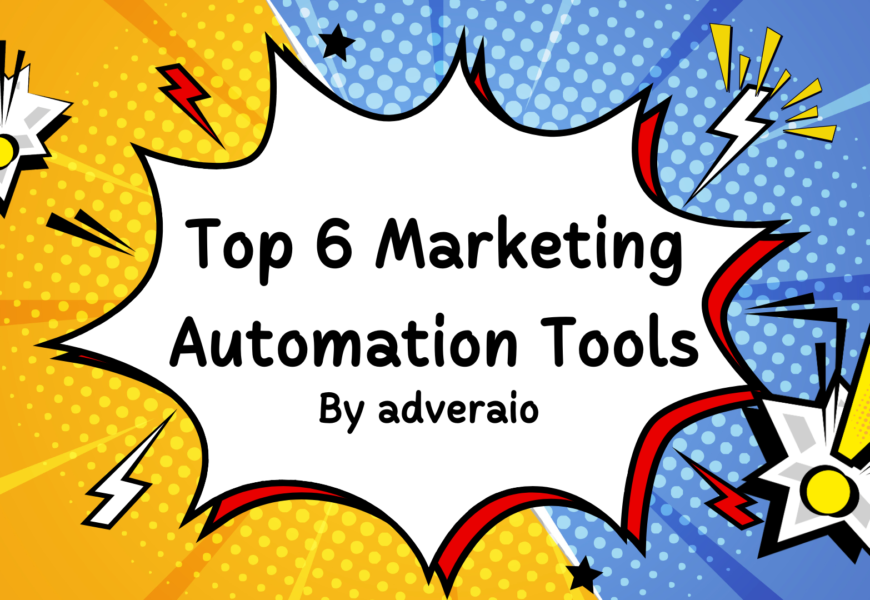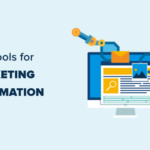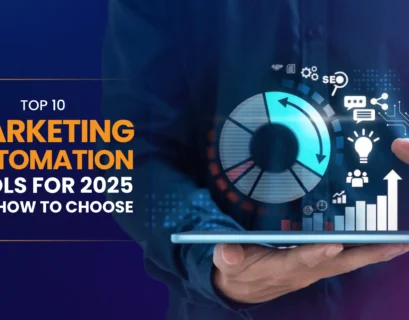In today’s fast-paced digital landscape, businesses are constantly looking for ways to improve efficiency, increase customer engagement, and scale their marketing efforts. Marketing automation tools have become indispensable for businesses of all sizes, enabling them to streamline processes, save time, and enhance their marketing strategies. Whether you’re a small startup or a large enterprise, integrating automation into your marketing can help you achieve better results with less effort.
In this article, we will explore the world of marketing automation, its benefits, and some of the most popular tools available in the market. First and foremost, we’ll introduce Adveraio, your go-to solution for all things marketing automation, followed by other top tools that can transform your marketing efforts.
What Are Marketing Automation Tools?
Marketing automation tools are software solutions designed to automate repetitive marketing tasks, such as sending emails, managing social media campaigns, tracking customer behaviors, and more. These tools are engineered to save time, reduce human error, and create personalized experiences for customers at scale. They are particularly useful for:
- Lead Generation: Automating the process of capturing and nurturing leads.
- Email Marketing: Setting up automated email sequences based on customer behavior.
- Customer Segmentation: Automatically segmenting your audience for more personalized messaging.
- Analytics & Reporting: Automatically tracking campaign performance and generating reports.
By using these tools, businesses can streamline their marketing processes, enhance customer engagement, and ultimately drive better ROI.
1. Adveraio: The Ultimate Marketing Automation Tool

Adveraio is a cutting-edge marketing automation platform that helps businesses automate their entire marketing ecosystem. With a user-friendly interface and powerful features, Adveraio is designed to streamline your marketing tasks, save time, and boost efficiency. It offers a variety of features that cater to businesses looking to enhance their marketing strategies, including:
Key Features of Adveraio:
- Email Campaigns and Automation: Easily create and automate email marketing campaigns based on customer behavior, preferences, and interests.
- Social Media Automation: Schedule and automate social media posts across platforms like Facebook, Twitter, and Instagram.
- Lead Management: Capture leads through forms, landing pages, and email opt-ins, then automatically nurture those leads using tailored content.
- Analytics and Reporting: Adveraio provides detailed insights into your campaigns, allowing you to measure performance and make data-driven decisions.
- Customer Segmentation: Automatically segment your audience based on demographic data, past behavior, and preferences, enabling personalized marketing efforts.
- CRM Integration: Integrate Adveraio with your existing CRM to ensure seamless lead management and customer journey tracking.
Why Choose Adveraio?
- Ease of Use: Its intuitive design makes it easy for even beginners to create and automate campaigns.
- Customizable Workflows: You can set up complex automation workflows based on specific triggers, such as email opens or website visits.
- Scalability: Whether you’re a small business or a large enterprise, Adveraio can scale with your needs.
- Affordable Pricing: With competitive pricing, Adveraio provides businesses of all sizes the tools they need to succeed without breaking the bank.
2. HubSpot: A Leader in Marketing Automation
HubSpot is one of the most well-known names in the world of marketing automation. With its all-in-one inbound marketing platform, HubSpot offers a wide range of features that help businesses attract, engage, and delight customers. Its marketing automation tool is particularly popular among small to medium-sized businesses and marketers who want an intuitive, feature-rich platform.
Key Features of HubSpot:
- Lead Nurturing: Automated email workflows to nurture leads throughout their journey.
- CRM Integration: HubSpot’s built-in CRM allows you to manage your contacts and automate communications directly from the platform.
- Landing Pages & Forms: Create customized landing pages and forms to capture leads and integrate them into automated workflows.
- A/B Testing: HubSpot allows you to test different versions of your emails, landing pages, and forms to optimize conversions.
- Advanced Analytics: Measure the success of your campaigns with detailed reporting and analytics.
Why Choose HubSpot?
- Ease of Use: HubSpot is known for its user-friendly interface, which makes it easy for marketers with little technical expertise to get started.
- All-in-One Platform: HubSpot integrates marketing, sales, and service tools in one platform, making it easier to manage all aspects of your business.
- Scalable: As your business grows, HubSpot offers several pricing tiers that can scale with your needs.
3. Mailchimp: A Great Tool for Email Marketing Automation
Mailchimp is a powerful email marketing platform that also offers automation features. While it started as an email marketing tool, it has evolved into a full-service marketing automation platform. Mailchimp is an excellent choice for small businesses, startups, and entrepreneurs looking to automate their email campaigns and marketing workflows.
Key Features of Mailchimp:
- Automated Email Campaigns: Set up welcome emails, follow-up sequences, and personalized email campaigns based on customer behavior.
- Audience Segmentation: Mailchimp allows you to segment your email list based on different criteria, such as purchase history or engagement levels.
- Advanced Analytics: Track open rates, click rates, and other metrics to measure the effectiveness of your campaigns.
- Social Media Integration: Mailchimp integrates with Facebook and Instagram, allowing you to create and automate social media ads alongside your email campaigns.
Why Choose Mailchimp?
- Affordable: Mailchimp is known for its free tier, which offers essential features for businesses just getting started with email marketing automation.
- User-Friendly: Mailchimp is intuitive and easy to use, even for beginners.
- Customizable Templates: Choose from a wide range of email templates to match your brand’s style.
4. Marketo: Best for Enterprise-Level Marketing Automation
Marketo, now owned by Adobe, is an advanced marketing automation platform designed for large enterprises. It offers robust features for managing and automating complex marketing strategies, making it ideal for businesses with large customer bases and diverse marketing needs.
Key Features of Marketo:
- Lead Management: Marketo provides advanced lead scoring, nurturing, and segmentation capabilities, allowing you to deliver the right message to the right audience at the right time.
- Multi-Channel Campaigns: Automate campaigns across email, social media, and paid ads.
- Advanced Analytics and Reporting: Gain deep insights into the performance of your campaigns, customer journey, and ROI.
- Customizable Workflows: Create detailed workflows and automate various marketing processes based on complex triggers.
Why Choose Marketo?
- Powerful Analytics: Marketo offers some of the most advanced reporting and analytics features in the industry.
- Customizable: It is highly customizable and can be tailored to fit the needs of large organizations.
- Enterprise-Ready: Marketo is ideal for businesses with large, complex marketing operations.
5. ActiveCampaign: A Perfect Tool for Customer Experience Automation
ActiveCampaign is a marketing automation tool that goes beyond just email marketing. It offers features for customer experience automation, which helps you create personalized, tailored interactions with your customers.
Key Features of ActiveCampaign:
- Email Marketing Automation: Automate your email marketing campaigns based on triggers like behavior and interaction history.
- Customer Experience Automation: Create automated workflows that engage customers at various stages of their journey, from awareness to post-purchase.
- CRM and Sales Automation: Manage customer relationships and automate sales processes seamlessly.
- Advanced Segmentation: Segment your audience based on behavior, demographics, and more for highly targeted campaigns.
Why Choose ActiveCampaign?
- Affordable: ActiveCampaign offers one of the most affordable solutions for marketing automation, especially for small businesses.
- Personalized Marketing: It allows businesses to create personalized experiences for their customers through automation.
- Great Customer Support: ActiveCampaign is known for its excellent customer service and resources.
6. Pardot: Automation by Salesforce
Pardot, owned by Salesforce, is a powerful marketing automation tool designed for B2B businesses. Pardot integrates seamlessly with Salesforce, allowing you to align marketing and sales teams for a unified strategy.
Key Features of Pardot:
- Lead Scoring and Nurturing: Automatically score leads based on engagement and intent, and nurture them through personalized email campaigns.
- CRM Integration: Seamlessly integrates with Salesforce CRM, providing a unified view of customers.
- Advanced Analytics: Gain insights into how your marketing efforts are impacting sales and revenue.
- Segmentation: Segment leads based on demographics, behavior, and other criteria.
Why Choose Pardot?
- Integration with Salesforce: If you’re already using Salesforce, Pardot is the natural choice for marketing automation.
- B2B Focus: Pardot is designed with B2B marketers in mind, offering features that cater specifically to business-to-business marketing needs.
Conclusion
Marketing automation tools are a game-changer for businesses seeking to streamline their marketing efforts and enhance customer engagement. From small startups to large enterprises, automation can significantly boost productivity and drive better results. Adveraio, with its powerful features, is an excellent choice for businesses looking to implement marketing automation at scale. Additionally, tools like HubSpot, Mailchimp, Marketo, ActiveCampaign, and Pardot offer great options depending on your business size, needs, and budget.
By leveraging the right marketing automation tool, businesses can save time, reduce manual errors, and deliver more personalized experiences to their customers. Whether you’re automating email campaigns, managing leads, or analyzing campaign performance, integrating these tools into your strategy will help you achieve better marketing outcomes and a higher return on investment.
Make the most out of marketing automation today and watch your business grow
FAQ about Marketing Automation Tools
Marketing automation tools are software platforms that automate repetitive marketing tasks like email campaigns, social media scheduling, lead generation, and customer segmentation. These tools help businesses save time, improve efficiency, and provide a personalized experience for customers.
Adveraio offers an all-in-one marketing automation solution with features like email campaign automation, social media management, lead nurturing, and advanced analytics. It’s designed to streamline your marketing processes, enhance customer engagement, and provide valuable insights into campaign performance.
Yes! Many marketing automation tools, including Adveraio and Mailchimp, offer scalable solutions for small businesses. These tools help automate marketing tasks, allowing small businesses to compete with larger enterprises without requiring a huge team.
Most modern marketing automation tools, like Adveraio and HubSpot, are designed to be user-friendly, even for non-technical users. They provide easy-to-use interfaces, templates, and workflows, making it possible for anyone to set up and manage automation campaigns.
By automating repetitive tasks and personalizing customer interactions, marketing automation tools allow businesses to engage with customers more effectively. This results in improved lead generation, higher conversion rates, and a more efficient use of marketing budgets, ultimately driving a better return on investment (ROI).






